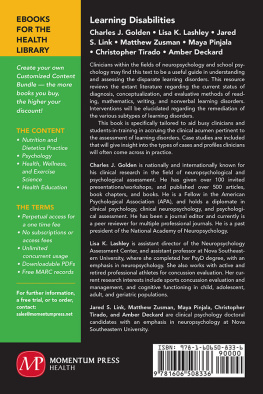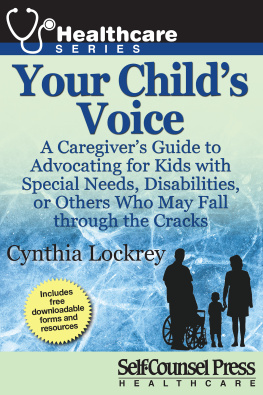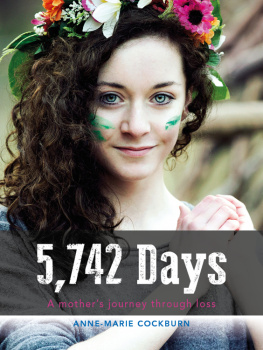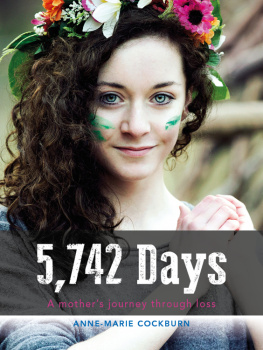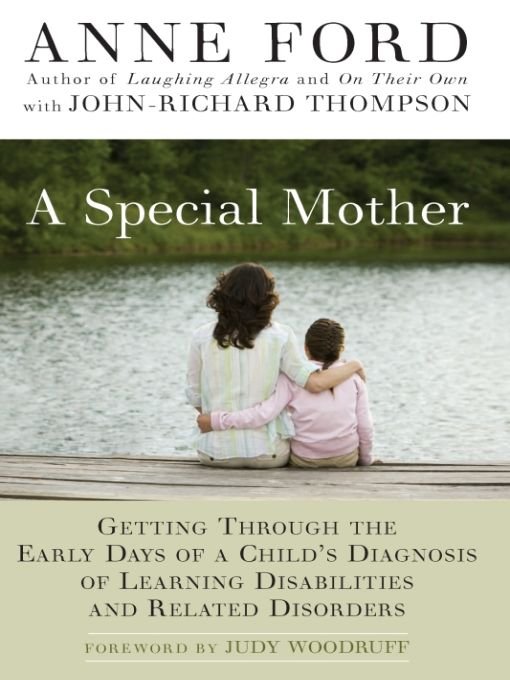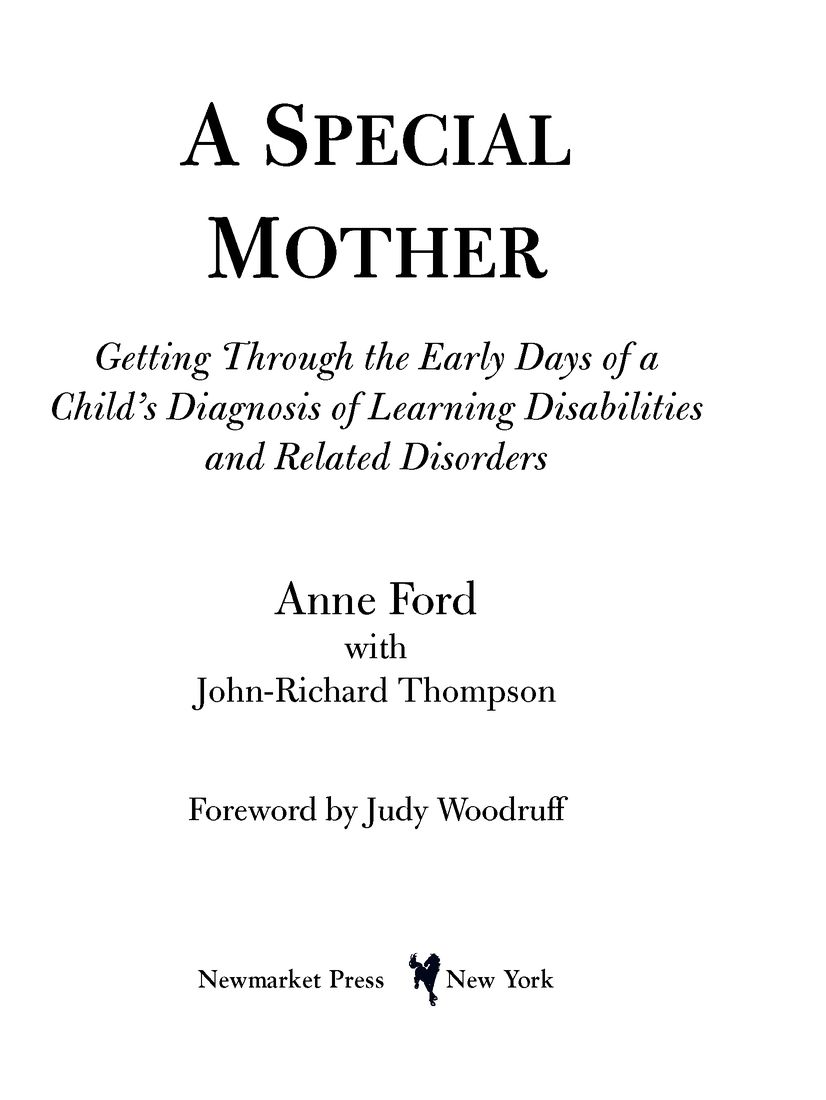Table of Contents
Other Newmarket Press Books
by Anne Ford
Laughing Allegra: The Inspiring Story of a Mothers Struggle and Triumph Raising a Daughter with Learning Disabilities
On Their Own: Creating an Independent Future for Your Adult Child with Learning Disabilities and ADHD, A Family Guide
JUDY WOODRUFF
When I sat down to write about my experiences as a mother of a son born with disabilities, I found it surprisingly difficult. First, it brought back painful memories of Jeffreys struggles. I remembered the times he was embarrassed, and imagined similar embarrassing incidents I didnt know about. I thought also of the teachers and administrators who were so ready to write him off. But it was also difficult because I am not used to thinking about how all this affected me.
As a busy professional, I am in the habit of jumping on problems and trying to fix them. I thought I could rise to practically any challenge by planning, sheer perseverance, or, as a fallback, negotiation. My husband, with a career of his own, has the same view. Failure was not in our vocabulary, especially when it came to our children. I was much more focused on getting the desired result, surmounting the obstacle, than on my personal reactions. That was not a bad thing: it was no doubt a main reason why we were able to get through the early phase of my sons schooling.
Our son Jeffrey, now twenty-eight, was born with a mild form of spina bifida, and we had to learn a whole new way to navigate in this world.
As a young boy, Jeff was incontinent and unable to run as fast as most other boys his age. At an academically challenging school where he was practically the only child with a disability, he had to cope with diapers and bladder and bowel accidents and, eventually, being shut out of competitive athletics. He also had ill-defined learning differences. He was very bright, but began reading at a later age than many other kids, and he struggled with complex math and abstract reading assignments.
We had been alerted that Jeff might experience learning challenges, but they revealed themselves slowly. It wasnt until well into his kindergarten year that his teacher pulled us aside and said it was taking Jeff longer than most of the other kids in his class to enjoy books. Eventually, he got the hang of readingbecame a good reader, in factand things smoothed out in first grade. But it wasnt long before math became an issue, and later so did his writing technique.
We were counseled to have Jeffrey independently tested, so he went through a battery of examinations, which produced a carefully worded, pessimistic report. There was no single diagnosis of a learning disability: Jeffs challenges were diffuse, as commonly happens to kids with spina bifida.
At some point, I brought to school copies of research reports I had obtained at a national spina bifida family conference, written for parents to share with their childrens teachers, to help explain to them what vulnerabilities were common in these kids and some proven teaching tactics. Some instructors eagerly read the material and tried to incorporate it; others were polite but not interested. By the time Jeffrey was in the third grade, one teacher urged us to pull him out rather than face the rigors of fourth. Fortunately, the following year, Jeffs teacher was a determined woman who liked him and was prepared to do anything to make sure he learned what he needed to learn.
As I look back on the experience, it was a roller coaster: one year up, the next year down. One teacher understanding, another impatient. I cant describe my own reactions without first describing Jeffreys: he quickly learned to hide his feelings; he became uncommonly good at acting as if none of these setbacks bothered him. He shrugged it off when learning was hard; it was no big deal. And he hated to be different from the other kidsto reveal in any way that learning was harder for him, that he needed help. In third grade, when he had to see a tutor every week, he complained that it wasnt necessary and that he was being unfairly singled out.
I had a hard time accepting that Jeffs learning problems were a permanent condition. I very much wanted to believe these were issues that could be overcome by hard work or tutoring. When I finally absorbed the fact that my beloved, adorable son was facing a long stretch of not only hard work, but harder work than most of his peers, it hurt. It hurt even more whenever he was singled out for his differences. It broke my heart. Not as much as it would be broken years later when Jeffrey experienced a serious health setback, but it was a definable ache that ebbed and flowed depending on how easy or hard a particular week went.
He managed to do well in school, with the help of tutors and other experts. But my husband and I often felt alone, navigating in unchartered waters, with few other boats. As far as we knew, few if any other kids and parents were going through anything similar. The school was focused on diversity of socioeconomic background and athletic ability, but not of learning styles. I didnt know many other mothers I felt comfortable sharing our worries and fears with.
Thats why this book is so valuable. Anne Ford has been a tireless advocate for children with learning disabilities. In A Special Mother she tells her own story and the stories of other mothers who might never have known about each other and might have assumed, as I did, that their situation was unique. If, in the earliest stages of understanding our child has a learning disability, we are able to recognize the signs, ask the right questions, seek help in the right places, weand our childrenmight be spared some of the inevitable pain of this diagnosis.
One of the things we now know about learning disabilities is that they affect not just the child but the childs family as well, often the mother most directly. You are fortunate to be reading this book, a supportive road map for the journey that lies ahead.
Judy Woodruff is a well-known news anchor and journalist.
We are pleased to announce that we have partnered with the National Center for Learning Disabilities (NCLD) to create a Web site component dedicated to the issues raised in this book. Theres a lot of great information out there on learning disabilities, more than we could possibly include in a single book. Through our link to NCLDs Web site at www.ld.org/aspecialmother, you will find links to further information, worksheets, resources, and other topics we could not include here. For example, I mention Parent Training and Information Centers (PTI) in the book. The Web site gives you more information about these centers and guides you to a state-by-state directory of them. To read about other topics beyond the confines of this book, go to the main NCLD Web site, www.ld.org, for links to excerpts from my previous books, Laughing Allegra and On Their Own, and to a wealth of further information and advice. These Web sites are updated from time to time, so you can always be assured of receiving the very latest news and information.
Both this book and the Web page were created to provide a basic understanding of the issues involved with a diagnosis of LD or a related disorder. They do not constitute legal advice and should not be used as a legal resource.
Special Mothers



